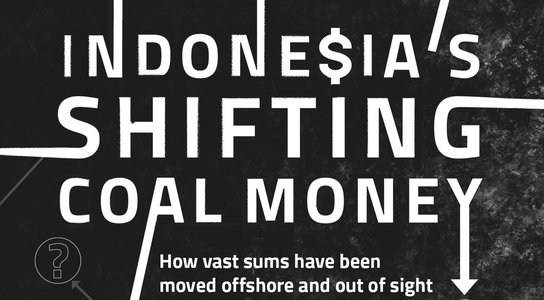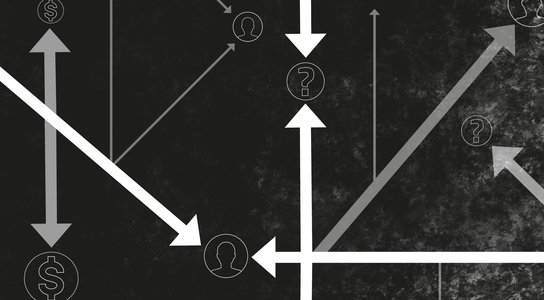Adaro Energy, one of Indonesia’s largest coal companies, has been moving vast amounts of profit from coal mined in Indonesia to its growing offshore network, raising the question of whether the network helps Adaro avoid or minimise tax in Indonesia.
Today’s report from Global Witness, Taxing Times for Adaro, reveals that from 2009 to 2017 Adaro’s arrangements with its Singaporean subsidiary, Coaltrade Services International, could have enabled the company to pay US$125 million less than it might otherwise have done in Indonesia. By moving more money through tax havens, Adaro may have reduced its Indonesian tax bill, and the money available to the Indonesian government for essential public services, by nearly $14 million a year(1).
‘Adaro’s extensive offshore operations appear to sit in stark contrast to their carefully constructed public image of proudly contributing to Indonesia. At the same time as the company already stands to benefit from a government guarantee for a major power station, it’s growing its complex offshore network and moving vast amounts of money out of the country’ said Stuart McWilliam, Climate Change Campaign Manager at Global Witness.
‘Our previous investigations have shown that the tax haven activities of Indonesian coal companies can add financial risk to their hazardous environmental impact. It’s now clear that the Indonesian coal industry is also becoming an acute reputational risk that the Indonesian government and investors should urgently distance themselves from.’
Financial statements show that the total value of sales commissions that
Coaltrade received in low-tax Singapore increased from an annual average of $4
million before 2009 to $55 million from 2009-17. Over 70% of the coal it sold came from Adaro’s
subsidiaries in Indonesia. The increased payments boosted profits in Singapore,
where they were taxed at an annual average of 10%(2). The profit from the
commissions from trading Adaro’s Indonesian coal might otherwise have been
taxed in Indonesia at the higher annual average rate of 50%(3). Global Witness
asked Adaro to comment on this point but received no reply.
In 2008, Adaro paid US$33m to settle a dispute with Indonesian tax authorities over its previous arrangements with Coaltrade(4).
The vast majority(5) of the profits registered in Singapore appear to have been moved further offshore to one of Adaro’s subsidiaries in the tax haven of Mauritius, where it was not subject to any tax at all before 2017, and may still not be(6).
The report also found that Adaro has recently acquired a subsidiary in the Malaysian tax haven of Labuan which it has used to purchase a large share in an Australian coal mine.
At the same time Adaro has expanded its offshore network, it stands to benefit from the Indonesian government’s financial guarantees for the US$4 billion Batang coal-fired power plant, in which Adaro is a joint venture partner(7).
Global Witness is calling on the Indonesian government to withdraw its plans for all new coal power stations and plan to transition to renewable energy. The NGO also urges investors to heed the reputational and financial risks connected to the industry and plan to end their financial support to Adaro and other coal companies.
/ ENDS
Contacts
Notes to editor:
- Coaltrade’s financial statements show that it paid a total of US$42.2 million in tax in Singapore between 2009 and 2017 (inclusive) on pre-tax profits of US$416.8 million, at an annual average tax rate of 10.7 per cent. This profit included sales and marketing of coal mainly for Adaro’s Indonesian subsidiaries, as well as third parties. Global Witness has calculated how much tax might potentially have been payable in Indonesia on Coaltrade’s approximate profit from sales and marketing of coal from Adaro’s Indonesian subsidiaries, at the average annual rate of tax paid by Adaro on profits in Indonesia over the same period, which was 50.8 per cent. 2017 is the most recent year for which Coaltrade financial statements were available, at the time the report was written.
- Ibid
- Ibid
- Adaro’s Indonesian subsidiaries had been selling coal to Coaltrade at a low price. Coaltrade then sold the coal on at the higher market price, and booked the profit in low-tax Singapore, rather than higher-tax Indonesia.
- 90% of Coaltrade’s net profit was paid up to the Mauritian subsidiary of Vindoor in the form of dividends.
- Coaltrade’s parent company in the Adaro Group is Vindoor in Mauritius, which in turn is wholly owned by Arindo Holdings in Mauritius. Arindo changed its corporate status in 2017 which meant it changed from not being subject to any corporate tax to being subject to a rate of up to 3%. Due to a lack of corporate disclosure requirements in Mauritius, only limited financial statements are publically available for Adaro’s Mauritian subsidiaries, and it is not possible to tell from this whether money paid in dividends by Coaltrade to Vindoor was in turn paid to Vindoor’s parent Arindo to then become subject to tax in Mauritius after 2017 or not.
- The Central Java Power Project (also known as the Batang Power Plant), is a 1.9GW power station being built by a joint venture company, PT Bhimasena Power Indonesia. This will be the biggest coal fired power station in Indonesia, if and when it is completed. Adaro formed this joint company together with two Japanese companies, J-POWER and Itochu, through its subsidiary of Adaro Energy, which owns a 34% stake. The electricity the company generates will be sold to PLN, Indonesia’s state-owned power company, which then sells it to consumers and businesses.
- Moving away from coal is part of a global financial trend. Aside from the concerns that Global Witness have raised in this report, and a report released in April linking Sandiaga Uno to payments from Berau Coal into an offshore company in the Seychelles, there is an accelerating withdrawal from funding coal. In February 2019, the Institute for Energy Economics and Financial Analysis published research showing that global capital is ‘fleeing the coal sector at an alarming rate’, with over 100 global financial institutions exiting coal, and banks, insurers or lenders announcing new restrictions on average every two weeks.
- About Global Witness: Global Witness investigates and campaigns to change the system by exposing the economic networks behind conflict, corruption and environmental destruction.
Interviews
are available on request. Please contact Claudia Elliot on [email protected]
or +44 (0)7792114449; Stuart McWilliam [email protected] or +44 (0)7711007199
You might also like
-
Briefing Indonesia’s shifting coal money 3: Taxing times for Adaro
Indonesian coal company that won awards for paying tax uses subsidiaries in tax havens to move hundreds of millions of dollars offshore.
-
Campaign Hub Indonesia's Shifting Coal Money
We already know coal is terrible for the environment, but our investigations into the Indonesian coal industry highlight a host of other risks
-
Press release Vice-Presidential candidate Sandiaga Uno linked to payments of millions of dollars shifted out of Indonesian company into an obscure offshore firm
New report links Sandiaga Uno to payments of at least US$43million from a major Indonesian coal company, Berau Coal, into an obscure offshore firm in the Seychelles.